Writing: Non-Fiction
Marion Simon Misch
Marion Misch participated in a great number of volunteer activities through her lifetime, all the while running a successful business following the death of her husband. Her primary interests centered on education and Judaism, and her volunteerism reflected her concern for these issues.
Ellen Moers
Ellen Moers’ Literary Women (1976), the third and last book of her career, is a benchmark of feminist criticism. While early critics attacked Literary Women for its exclusive focus on women writers, her analysis of Mary Shelley and other women writers reshaped our understanding of their work.
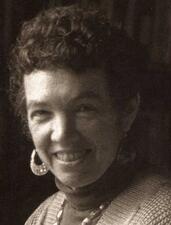
Deborah Dash Moore
Deborah Dash Moore is a leading scholar of American Jewish history. Her influential work has focused on both urban and visual Jewish history in locales from New York to Miami to Los Angeles. A prolific interpreter of Jewish and American culture, Moore has played a key role in making American Jewish history a recognized subfield in the academy.
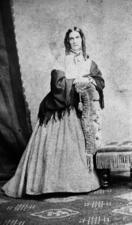
Emma Mordecai
Emma Mordecai (1812-1906) navigated direct challenges to her Jewish faith and to her southern ideals by remaining loyal to both. She responded to the Civil War, which stirred antisemitism in the South and especially threatened Richmonders, with renewed commitments to Judaism and to the racist ideals of the Confederacy.
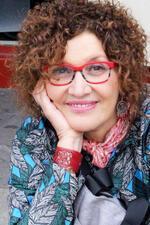
Myriam Moscona
Myriam Moscona is a Sephardic Mexican poet, novelist, journalist, and translator. She is the author of Tela de sevoya/ Onioncloth, an award-wining novel about the Sephardic experience, reflecting on death and Ladino, and Ansina (Like that, 2015), a book of poetry entirely written in Judeo-Spanish.
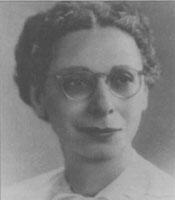
Bessie Louise Moses
Mary Moss
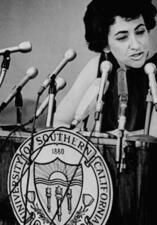
Barbara Myerhoff
An award-winning anthropologist and feminist scholar, Barbara Myerhoff emphasized the importance of storytelling and studying one’s own community. Myerhoff’s work pioneered the study of elderly Jews and highlighted the role of women in religion, which had been previously neglected by the scholarly world.

Bess Myerson
Lazarus, Nahida Ruth
Nahida Ruth Lazarus was a German-Jewish cultural and literary critic, author, journalist, and essayist who was born in Berlin to a German-Christian family and converted to Judaism in 1895. She is best known for her published source book, The Jewish Woman (1891), a product of her fundamental interest in both feminism and Judaism that remains an important text for women’s and gender studies.
Adele Gutman Nathan
Adele Gutman Nathan was a prolific writer, theater director, and creator of historical pageants and commemorative events. She wrote fourteen children’s books, in addition to newspaper and magazines articles. Nathan directed theater in Baltimore and New York and staged events from the 1933 and 1939 World’s Fairs to the hundredth anniversary of the Battle of Gettysburg.
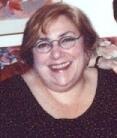
Sheryl Baron Nestel
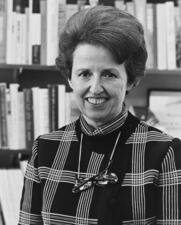
Bernice L. Neugarten
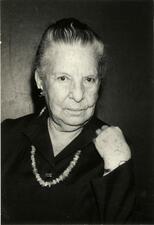
Miriam Novitch
Miriam Novitch was a member of the French Resistance during World War II and, after, an advocate for education on the Jewish resistance and the experiences of Holocaust survivors. She was one of the founders of the Itzhak Katzenelson Holocaust and Jewish Resistance Heritage Museum (also known as the Ghetto Fighter’s House, or GFH) and served as the curator for its art collection for many years.

Dalia Ofer
Dalia Ofer is an Israeli historian whose work mainly focuses on women’s experiences in the Holocaust and collective memory of the Holocaust in Israeli society. Ofer has published a multitude of books and articles on these topics during her career, and she has held positions at many prestigious universities around the world including the Hebrew University of Jerusalem, Harvard, Yale, and Columbia.

Suze Orman

Alicia Suskin Ostriker
Alicia Ostriker is a feminist revolutionary, a poet, critic, and creator of contemporary midrash. She is one of an increasing number of women writers who have the courage to approach bibliocal history and legend from an unorthodox, feminist point of view.
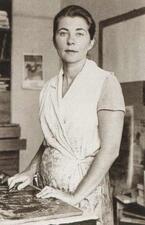
Fayga Ostrower
Fayga Ostrower, born in Poland, began her artistic career after her family immigrated to Brazil, where she quickly developed a love and a talent for engraving. Her award-winning works have been displayed across the world, and she wrote many books reflecting on the power of art as a universal human language.
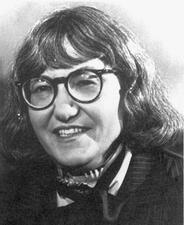
Cynthia Ozick
Cynthia Ozick is a Jewish-American writer, novelist, essayist, and playwright. Her creative, authentic, and intelligent stories, including “The Shawl” (1989) and “The Puttermesser Papers” (1997), have made her one of the greatest fiction writers and literary critics alive.
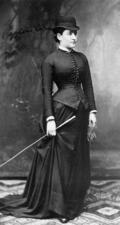
Bertha Pappenheim
Bertha Pappenheim was the founder of the Jewish feminist movement in Germany. In 1904, she founded the League of Jewish Women. Pappenheim believed that male-led Jewish social service societies underestimated the value of women’s work and insisted on a woman’s movement that was equal to and entirely independent of men’s organizations.
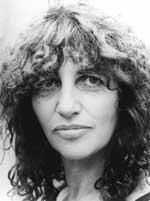
Ruth Peggy Sophie Parnass
Born in Germany, Ruth Peggy Sophie Parnass was sent to Sweden to escape the Nazis. Parnass became a journalist, actress, court reporter, feminist activist, and writer. Parnass combines her private and public lives in her writing, whether on her childhood under Nazi rule in Hamburg and as an exile in Sweden, on women's issues, or on political matters.
Jessica Blanche Peixotto
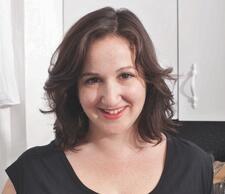
Deb Perelman

Miriam Zoila Pérez
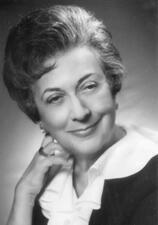
Helen Harris Perlman
With almost seventy years as a social work practitioner, supervisor, teacher, consultant, and author to her credit, Helen Harris Perlman was a legend in her field. She pioneered the “Chicago School” of social work, arguing that many people in crisis needed short-term therapy and solutions rather than long-term Freudian analysis.


